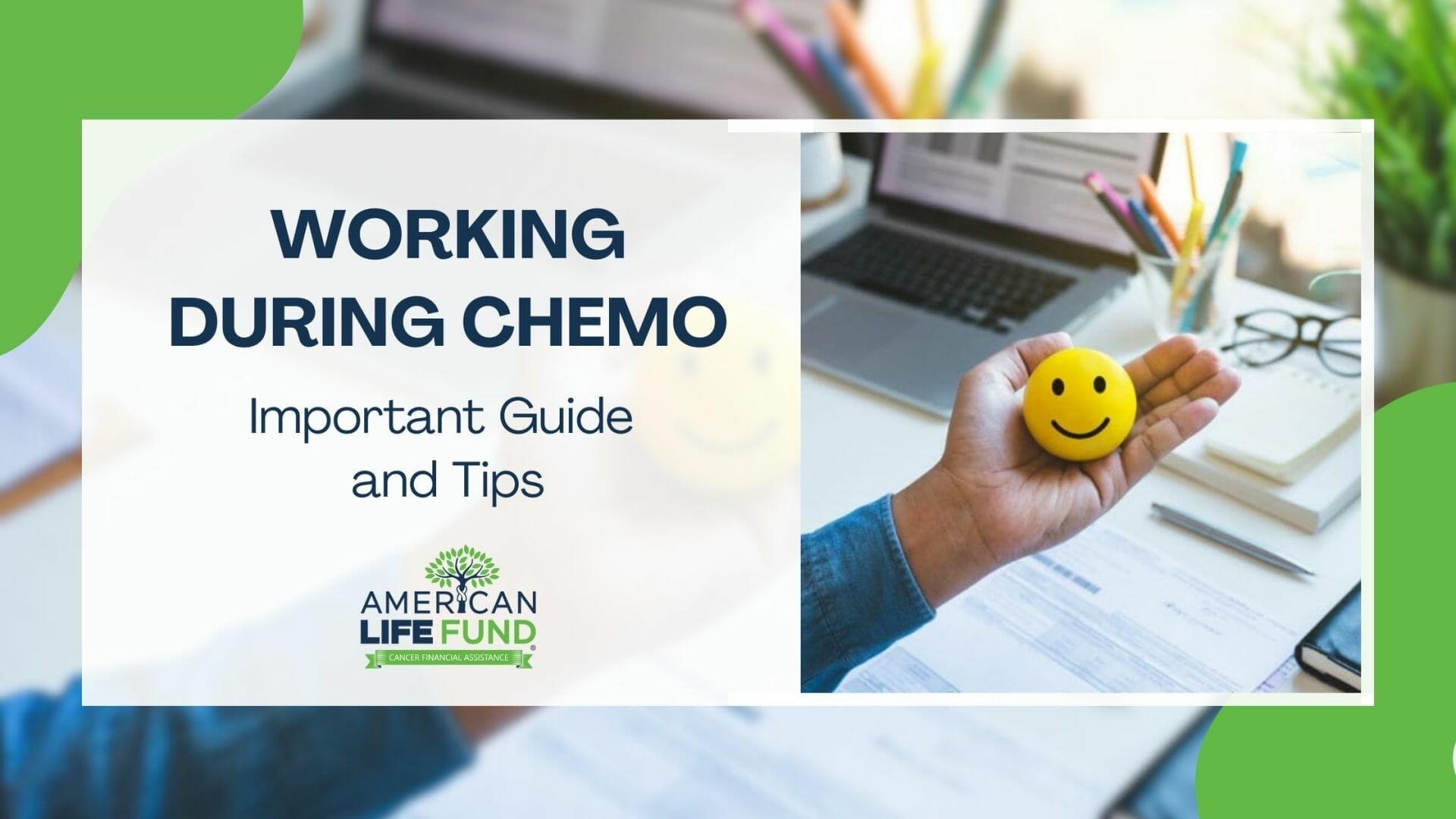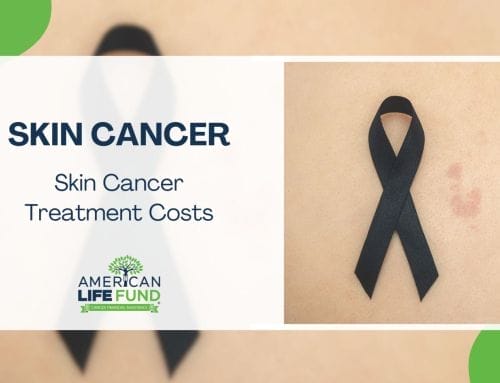Cancer treatments, including chemotherapy, can be both physically and mentally tiring. Those going through chemotherapy often think they won’t be able to work during treatment, but it doesn’t have to be that way. Many people can still work while getting treatment, and those who do often find that the structure of a job helps them stay positive and focused. Here are some tips on how to make working during chemo easier.

Can You Work During Chemo And Cancer Treatment?
You may be worried that cancer treatment means putting your life on hold. But while, of course, this is a difficult time, it’s important to know that you should never feel like you have no choice other than to stop working completely.
Depending on the stage and type of cancer treatment, many people can continue working during their treatments. Working outside of the home can provide a break from recovery. It can give you something to focus on away from the type of appointments associated with cancer care. Looking into whether you can work remotely may also be an option depending on your current position.
More >> Learn about the stages and types of cancer
How much you can do normally depends on how severe your treatments are. If they’re not too draining or disruptive, keeping or returning to work could help lift your mood and boost your sense of purpose throughout this trying time. Depending on your treatment plan, aggressive treatments tend to greatly affect energy levels.
Factors That Can Affect Your Ability to Work During Your Cancer Treatment Schedule
- The stage of your cancer diagnosis
- Your overall health condition
- The nature of your work
How Soon Can You Return to Work After Chemotherapy or Treatment?
After you’ve completed chemotherapy or radiation treatment, you may be eager to return to your normal routine. However, giving yourself time to recover from the possible side effects before returning to work is important.
Depending on your cancer type and the treatment you receive, you may need to take several weeks or even months off from work. Talk to your doctor about when it’s safe to return to work. They can give you specific advice based on your situation.
Adjusting to The Work Environment
When you return to work after short-term disability or an unpaid leave, it’s important to know that your body will still adjust. You may need more rest than usual and feel like doing less than you used to.

Do I Need to Tell My Employer I Have Cancer?
It’s up to you whether or not you tell your employer about your cancer. It might be helpful for them to know so that they can be accommodating and adjust any tasks that could put unnecessary strain on you during treatment.
Telling Your Supervisor
You are not alone. Going through a cancer diagnosis and treatment can be difficult and tiring. There is strength in knowing you can make it through with the right help and support.
Telling your supervisor about your health condition can be challenging, but managing expectations about your work on this journey gives you the space to focus on more important things.
It takes courage to be comfortable talking about something like this. In doing so, you take care of yourself and protect the quality of your relationships at work.
Telling Your Co-workers
Talking to co-workers about such a personal issue can be intimidating. However, remember that you’re not alone in your fight against cancer. Many workplaces have more resources and support than you might think.
Above all, understand your physical and mental limitations during this difficult time so that you can engage in meaningful conversations with friends and colleagues who can offer emotional guidance along the way.

Your Work Must Provide Reasonable Job Accommodations
When you are undergoing cancer treatments, managing your work performance can be difficult. In such a situation, your employer must be cooperative, understanding, and supportive. There may be some changes that you need to make during your treatment to ensure your safety, focus on recovery, and maintain good work performance.
A reasonable arrangement could include a reduced work schedule or modified duties. Employers must remember that even small concessions given during this time can help reduce stress and make sure you feel supported through a trying experience.
Effective communication with your company’s human resources department is important. Being transparent and showing compassion during the conversation can help build mutual trust between the employer and the employee. A workplace that values its employees should accommodate reasonable requests and show genuine care for those dealing with illness.
Understanding The FMLA
Whether you are an employer or an employee, knowing your workplace rights and responsibilities with the Family Medical Leave Act (FMLA) is essential. This is especially true for those who are about to start chemotherapy.
Under the FMLA, employers must provide up to 12 weeks of unpaid leave for employees who need time off for a personal illness or to care for an ill family member. While on this leave, workers can count on job protection, meaning they have the right to return to the same job they had before their unpaid leave began.
So if your doctor has prescribed chemotherapy or radiation treatments and you require time off to take care of yourself, make sure you understand and know your FMLA rights.

Workplace Discrimination Against People With Cancer
Workplace discrimination is illegal, similar to disability discrimination, and cancer patients should not worry about job security due to illness. You need to take action if you feel like you are being discriminated against because of your cancer diagnosis.
You may be entitled to certain protections under federal and state laws, the Americans with Disabilities Act (ADA) or the Rehabilitation Act of 1973. All of these prohibit employers from discriminating against people with disabilities. This includes cancer patients.
If you feel your employer needs to honor these rights, it is important to reach out for help and support from other resources. It’s also important to record any communication or behaviors that make you feel uncomfortable in the workplace.
Legal Protections For Working People With Cancer
Knowing your legal rights is essential if you are employed and dealing with a cancer diagnosis. Awareness of the protections available to you is important in helping protect yourself from job discrimination or loss of wages due to illness.
At the same time, it’s important to remember that many employers have policies around reasonable leave and accommodation for employees dealing with illness. It’s worth asking about what is available from the human resources department so that you can make an informed decision on how to proceed in your particular situation.
It can be difficult to know where to turn if you feel your rights are not being met. However, many organizations and legal services are available to provide support and guidance.
Tips For Working While You Are Getting Treatment
When working while under medical care, the most important thing is to listen to your body and rest when you need it.
- Spending time on self-care can help you stay healthy and give you more energy to complete your job duties.
- This may require adjusting your daily schedule, taking a quick walk or stretch, taking anti-nausea medication, or making more time to rest and recover from treatment.
- Avoiding setting unrealistic goals and expectations for yourself while undergoing cancer treatment is also important.
- Communicate openly with your boss about what kind of accommodations would be helpful to ensure a healthy work-life balance.
Don’t hesitate to take advantage of any employee assistance programs or workplace policies that could help you cope with your illness. You can set boundaries for example. Your employer should be understanding and provide reasonable accommodations. They should also show genuine concern and compassion for employees with health conditions.
Viatical Settlements: Providing Financial Relief During Cancer Treatment
For those undergoing cancer treatment, managing finances alongside medical needs can be overwhelming. Viatical settlements offer a solution, allowing individuals to sell their life insurance policy for a lump sum payment. This immediate financial assistance helps cover medical expenses, lost income during treatment, and unexpected costs like transportation and home modifications.
American Life Fund specializes in viatical settlements, providing quick access to funds for individuals facing life-threatening illnesses like cancer. Individuals can maintain stability, navigate employment challenges, and address unforeseen expenses without delaying insurance processes with viatical settlements. Incorporating viatical settlements into financial planning offers much-needed relief. It empowers individuals to focus on their cancer journey with peace of mind.
More >> Discover the Steps for applying for a viatical settlement

Frequently Asked Questions
Q: What Should You Not Do During Chemotherapy?
A: It is important to avoid activities that place too much strain on your body, such as heavy lifting or strenuous exercise. It would be best if you also stayed away from areas where temperatures are very cold or hot and limited exposure to direct sunlight. It is important to avoid alcohol and certain foods that could interact with chemotherapy drugs. Avoid smoking and using any recreational drugs. Talk to your doctor if you have questions about specific limits on activity and lifestyle during chemotherapy.
Q: What Kind of Accommodations Can I Request at Work?
A: Different accommodations may be needed depending on the type of cancer treatment you are undergoing. These could include:
-providing a flexible schedule
-sick time or paid time off for your current medical condition
-additional breaks during the day
-additional help from co-workers
-modified job duties
-telecommuting or remote options
It’s important to discuss any limitations or needs with your health care team. Share these needs with your employer and work together to find an acceptable solution. Your employers should understand the importance of accommodating your needs so that you can continue to work safely and productively through this particular life change.
Q: Can You Live a Normal Life While on Chemo?
A: Yes, it is still possible to lead a normal life while undergoing chemotherapy. This can include activities like going out with friends, exercising regularly, and engaging in hobbies. Talk to your doctor about any limitations that may need to be kept in mind while engaging in various activities. It’s important to listen to your body and take rest days as needed, especially if you feel tired.
Q: Do You Have to Stay Away From People During Chemo?
A: Generally, while undergoing chemotherapy it is safe to spend time with people. However, if you have a weakened immune system due to the treatment, avoiding large crowds and family members who may be sick is best. Your doctor or nurse must know if you’ve had any contact with someone with an infection or cold-like symptoms. Taking these precautions can help keep you healthy and safe during treatment.
Q: Should I Quit my Job if I Have Cancer?
A: This is a personal decision that should be made individually. It’s important to consider the type of cancer you have, how it will affect your job responsibilities, and any medical advice from your health care team.
If options are available to help manage your work schedule while undergoing treatment, it may be in your best interest to stay at your job. If that is not possible, it may be necessary to take a leave of absence or withdraw from employment. In this case, health insurance benefits, disability insurance, or supplemental security income would be helpful to avoid any undue hardship.
American Life Fund may be able to provide financial assistance to help you manage bills and other expenses while on leave. We understand that a cancer diagnosis can have a significant impact on your life and we are here to offer support and resources during this difficult time.
Contact us today, we are here to answer questions or concerns about managing the financial impacts of cancer treatment.





